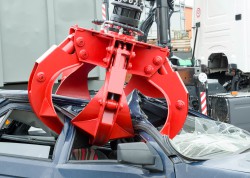



 |
We are collecting up to 31st December, then closed 1st January. We will be collecting as normal again from January 2nd 2026! Happy new year to you all |
Separately from the UK CMA, the European Commission has also fined 15 major car manufacturers and the European Automobiles Manufacturers' Association (ACEA) a total of around €458 million for participating in a long-lasting cartel concerning end-of-life vehicle recycling. Mercedes-Benz was not fined, as it revealed the cartel to the Commission under the leniency programme. All companies admitted their involvement in the cartel and agreed to settle the case.
The EC coordinated its investigation with the UK Competition & Markets Authority (‘CMA'). The CMA also adopted a decision concerning the same practice for breaches of UK competition law.
The infringement
The EC’s investigation revealed that, for over 15 years, 16 major car manufacturers (including Mercedes, which was not fined) & their trade body ACEA entered into anticompetitive agreements & engaged in concerted practices related to the recycling of ELVs.
In particular, the Commission found that the parties colluded on two aspects:
1. They agreed not to pay car dismantlers for processing ELVs. In particular, they agreed to consider the recycling of ELVs to be a sufficiently profitable business, & therefore not to remunerate car dismantlers for their services (so-called “Zero-Treatment-Cost” strategy). The companies also shared commercially sensitive information on their individual agreements with car dismantlers & coordinated their behaviour towards dismantlers;
2. they agreed not to promote how much of an ELV can be recycled, recovered & reused & how much recycled material is used in new cars. Their goal was to prevent consumers from considering recycling information when choosing a car, which could lower the pressure on companies to go beyond legal requirements.
Under Directive 2000/53/EC on ELVs, the last owner of an ELV must be able to dispose of it at no cost with a dismantler & if needed, car manufacturers are obliged to bear the costs. Moreover, consumers are required to be informed about the recycling performance of new cars.
The investigation found that ACEA was the facilitator of the cartel, having organised numerous meetings & contacts between car manufacturers involved in the cartel.
The Commission's investigation revealed the existence of a single & continuous infringement in the European Economic Area (‘EEA'), spanning over 15 years, from 29 May 2002 to 4 September 2017.
Fines
The fines were set on the basis of the EC’s 2006 Guidelines on fines. In setting the fines, the Commission took into account various elements, including the number of cars concerned by the infringement, the nature of the infringement, its geographic scope & its duration. When setting the fine, the EC also took into account the lesser involvement in the infringement of Honda, Mazda, Mitsubishi and Suzuki. It also granted a reduction to Renault as evidence showed that Renault had explicitly asked for an exemption from the agreement not to advertise the use of recycled material in new cars.
4 companies cooperated with the EC under the leniency programme:
In addition, under the Commission's 2008 Settlement Notice, the Commission applied a reduction of 10% to the fines on all parties, as they acknowledged their participation in the cartel & their liability.
The fine of ACEA, for its facilitating role, is set as a lump sum. The fine takes into account that all car producers, which are members of ACEA, have been fined individually.
The Commission's investigation was triggered by an application under the Commission's 2006 Leniency Notice submitted by Mercedes-Benz in September 2019. This was followed, after the inspections in March 2022, by successive leniency applications submitted by Stellantis, Mitsubishi and Ford.
More information on this case will be available under case number AT.40669 in the public case register on the Commission's competition website once confidentiality issues have been resolved. For more information on the Commission's action against cartels, see its cartels website.
The settlement procedure
The settlement procedure for cartels was introduced in June 2008. In a cartel settlement, parties acknowledge their participation in a cartel & their liability for it. They also accept the maximum amount of the fine which the Commission intends to impose. Cartel settlements are based on Regulation 1/2003, & allow the Commission to apply a simplified & shortened procedure. This benefits consumers & taxpayers as it reduces costs. It also benefits antitrust enforcement as it frees up resources. Finally, the parties themselves benefit in terms of quicker decisions & a 10% reduction in fines. Today's decision is the 43rd settlement since the introduction of this procedure for cartels.
Leniency programme
The Commission's leniency programme gives companies the opportunity to disclose their participation in a cartel & cooperate with the EC during an investigation. A successful leniency applicant will either completely avoid a potentially high fine or receive a substantial reduction from it.
Teresa Ribera, Executive Vice-President for Clean, Just and Competitive Transition said:
“Today, we have taken firm action against companies that colluded to prevent competition on recycling. These car manufacturers coordinated for over 15 years to avoid paying for recycling services, by agreeing to not compete with each other on advertising the extent to which their cars could be recycled, and by agreeing to remain silent on the recycled materials used in their new cars. We will not tolerate cartels of any kind, and that includes those that suppress customer awareness and demand for more environmental-friendly products. High quality recycling in key sectors such as automotive will be central to meeting our circular economy objectives, not only to cut waste and emissions, but also to reduce dependencies, lower production costs and create a more sustainable and competitive industrial model in Europe”
https://ec.europa.eu/commission/presscorner/detail/en/ip_25_881